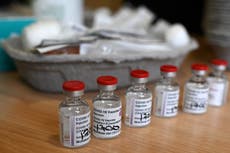New data shows Covid vaccines are ‘extremely safe’, says UK medicine regulator
'We remain confident that the benefits of these vaccines outweigh any risks'
The Covid-19 vaccines are “extremely safe”, the UK's medicines regulator has said, as it released new analysis which shows the “vast majority” of reported side effects are mild in nature.
Data compiled by the Medicines and Healthcare products Regulatory Agency (MHRA) found there were 22,820 reports of suspected side effects between 9 December 2020 and 24 January, with 6.9 million doses administered over this period.
This means 3 in 1,000 people reported some form of adverse reaction to the MHRA’s Yellow Card, which has been used since 1964 to record suspected side effects of medicines and defective or fake medical products.
The MHRA said that many people will not have reported their side effects, and that the Yellow Card cannot be used to quantify all adverse reactions within the population.
In line with clinical trial data, more than 1 in 10 people may get a sore arm and general symptoms that can resemble a mild ‘cold-like illness’, such as a headache, muscles aches or chills, the MHRA added.
It said the “vast majority of reported side effects are mild and short lasting, reflecting a normal immune response to vaccines” – similar to the seasonal flu jab.
Dr June Raine, chief executive of the MHRA, said: “Vaccines are the most effective way to protect against Covid-19 and save lives and prevent serious complications from this terrible virus.
“The data we have collected provides further reassurance that the Covid-19 vaccines are safe and continue to meet the rigorous regulatory standards required for all vaccines. We remain confident that the benefits of these vaccines outweigh any risks."
Between one and two per cent of adverse reactions were moderate to severe in nature, though symptoms typically dissipated after a day, the MHRA said. In all cases, follow-up analyses were conducted to assess the cause of the side effects.
The MHRA said widespread use of the vaccines now suggests that severe allergic reactions to the Pfizer/BioNTech jab are very rare, having been reported at a rate of between one and two cases per 100,000 doses.
Overall, the MHRA received 101 reports of severe allergic reactions – associated with anaphylaxis or anaphylactoid reactions – for the Pfizer jab, and 13 for the Oxford vaccine. All the people recovered as far as the MHRA was aware.
The regulator said anaphylaxis can be a very rare side-effect to many types of vaccines.
The regulator also received 69 reports of facial paralysis or weakness with the Pfizer/BioNTech vaccine and six for the AstraZeneca jab.
When it compared such reports with the rate at which facial paralysis can occur naturally, it said the rate was similar and does "not currently suggest an increased risk following the vaccines".
Some 107 reports involved patients who died shortly after vaccination with the Pfizer/BioNTech jab, alongside 34 reports for the Oxford vaccine.
"The majority of these reports were in elderly people or people with underlying illness," the MHRA said in its study.
"Review of individual reports and patterns of reporting does not suggest the vaccine played a role in the death."
Of other suspected reactions, the MHRA said "there are currently no indications of specific patterns or rates of reporting that would suggest the vaccine has played a role".
Side-effects overall appeared to be more common in younger age groups, but the MHRA suggested there may be biases in reporting, with these people more likely to report any adverse reaction.
Safety data has been monitored via other surveillance networks alongside the Yellow Book but has similarly not shown any safety concerns, the MHRA added.
The UK regulator has also received further trial data from AstraZeneca that supports their view that the Oxford vaccine is effective in the elderly.
"Since (initial approval) we've seen more data coming through from AstraZeneca as more people are completing the trial, which highlights again that efficacy in the elderly is seen, and there's no evidence of lack of efficacy,” said Sir Munir Pirmohamed, who has consulted with the MHRA in assessing the safety and effectiveness of the Covid vaccines.
The MHRA was the first regulator to approve the Oxford vaccine in December, but other European countries have said more data is needed before it is given to those over 65.
Join our commenting forum
Join thought-provoking conversations, follow other Independent readers and see their replies
Comments


Bookmark popover
Removed from bookmarks